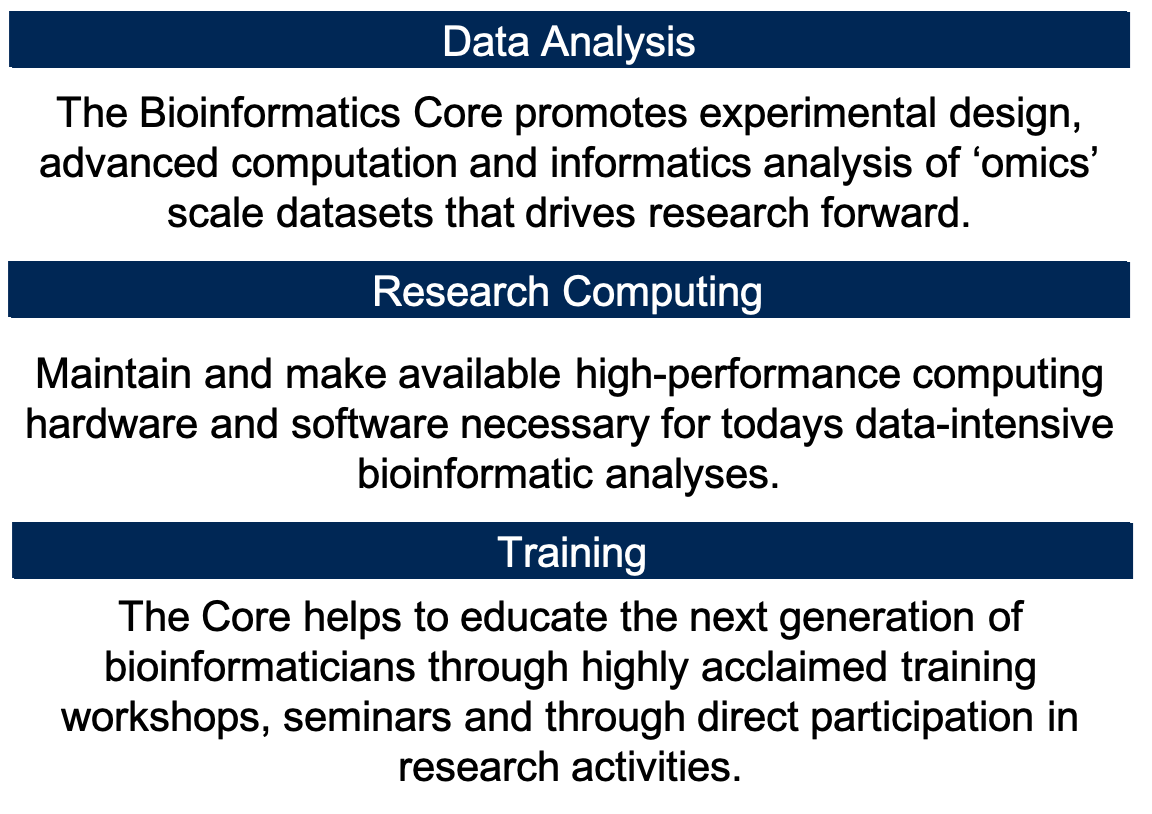Quick Introduction to the Workshop and Core
The mission of the Bioinformatics Core facility is to facilitate outstanding omics-scale research through these activities:

Staff and Students
Our team offers custom bioinformatics services to academic and private organizations. We have a strong academic background with a focus on cutting edge, open source software. We replicate standard analysis pipelines (best practices) when appropriate, and/or develop novel applications and pipelines when needed, however we always emphasize biological interpretation of the data.

Contacts
-
Request for data analysis services, consultations.
-
Bioinformatics training course information
-
Computing Issues, include but not limited to user account questions, equipment failure/malfunction, software install, software failures (not related to use).
Structure of the Virtual Workshops
Given the current Covid19 pandemic, and stay in place orders around the world, we’ve decided to take our popular bioinformatic workshops virtual. Our intent is to offer as close to an experience we can to our in-person workshops. We will hold the same goals and strive for a similar lecture/hand-on ratio. We will be using multiple technologies in order to help facilitate a maximum amount of interaction.
Zoom
Course lecture, discussions, and one-on-one help/troubleshooting will be conducted using a zoom meeting.
- Each participant will be provided a break out room that will allow one-on-one troubleshooting by our staff and TAs, screen sharing and even remote control.
- The Chat features of Zoom will not be our primary mode of text communication as its history is not reliable.
- We will try and stick to a schedule to allow people to plan their day and know when they need to be back at their computers for lecture.
- Video recordings of lectures will be made available to participants.
Because video is involved, we ask everyone to be respectful and we reserve the right to remove someone if they are being disrespectful or disruptive.
Slack
Text based communication will be conducted via a Slack channel. Staff will be monitoring the Slack channel to answer questions (and schedule a Zoom break out room if needed). If you know the answer to someone elses question, feel free to answer it.
Patience
We ask for a little more patience as this process is also new to us, but we are comitted to providing you the best educational experience we can (under the current conditions).
Workshop Goals
- Current Topics in Genome Assembly
- Discussions/lectures
- Technologies
- Experimental design
- Snakemake
- Kmers
- PacBio HiFi and IPA assembler
- Oxford Nanopore Assembly
- Bionano Genomics Scaffolding
- Scaffolding with HiC (Phase Genomics)
- Busco and Assembly QA/QC
- Goal is 30-40% lecture/discussion 60-70% hands-on
Workshop Materials
Workshop materials are all posted on github, and publicly available
http://bioinformatics.ucdavis.edu/training
-
Workshop registration site:
-
Public Github repository listing:
-
This Genome Assembly Workshop
https://ucdavis-bioinformatics-training.github.io/2020-Genome_Assembly_Workshop/
Computing Cluster
A portion of this course will be conducted on our servers and compute cluster (tadpole.genomecenter.ucdavis.edu).
Instructions on how to get an account will be sent by email
If you already have, or have had in the past, an account on our systems, then please tell us your username, or email, and we will add you to the workshop. Do not create a new account
Cluster usage will be under the slurm reservation ‘genome_workshop’
